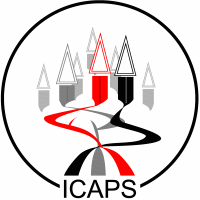|
|
Tutorial 1. Planning and Learning
Topic
Current planning algorithms can achieve impressive performance in many
domains and problems. However, there is still place for improvement
among several dimensions, such as consideration of quality, dynamic
changes in domain and quality descriptions, or integration of planning
and scheduling (time and resources reasoning). One way to improve
current fast algorithms consists on integrating machine learning with
planning to automatically improve the planning domain description,
performance or plan quality with experience. This tutorial will cover
issues concerning representation of learned knowledge, learning
opportunities of current planning techniques, and different learning
approaches, including deterministic and nondeterministic planning.
Intended Audience
This tutorial is targeted at planning and scheduling researchers interested in
providing learning capabilities to their planning & scheduling systems. It is
also targeted at KR researchers given that we will address some knowledge
representation issues related to structures for representing knowledge, or
effects of representation changes with respect to learning and planning.
Presenters Information
 |
Daniel Borrajo is
a Professor of Computer Science at Universidad Carlos III de
Madrid. He has published over 90 journal and conference papers
mainly in the field of machine learning and problem solving.
Prof. Borrajo's main research interest is the integration of
different Artificial Intelligence techniques, specially concerning
machine learning and problem solving. Since 1989, he has been
working with Prof. Carbonell and Prof. Veloso group in the Prodigy
architecture, a planning system integrated with several learning
modules. He developed Hamlet, a system that learns individual
control knowledge for planning domains based on an incremental
refinement of the learned knowledge. He is now interested on
issues such as the integration of planning and scheduling,
learning for improving the quality of the solutions, or new
generalization techniques for reinforcement learning.
Prof. Borrajo has organized several international conferences
including ECP-01. He is currently member of the Network Executive
Committee of PLANET, the European Research Network on Planning.
|
 |
Manuela M. Veloso
is Professor of Computer Science at Carnegie Mellon University.
Prof. Veloso researches in the area of artificial intelligence
with focus on planning, control learning, and execution for single
and multirobot teams. Her algorithms address uncertain, dynamic,
and adversarial environments. Prof. Veloso has developed teams of
robot soccer agents, which have been RoboCup world champions
several times. She investigates learning approaches to a variety
of control problems, in particular the performance optimization of
algorithm implementations, and plan recognition in complex data
sets. Prof. Veloso is Vice President of the RoboCup International
Federation. She was awarded an NSF Career Award in 1995 and the
Allen Newell Medal for Excellence in Research in 1997. As of July
2003, she is a Fellow of the AAAI (American Association for
Artificial Intelligence). |
Tutorial 1
Tutorial 2
Tutorial 3
Tutorial 4
Tutorial 5
|
|


